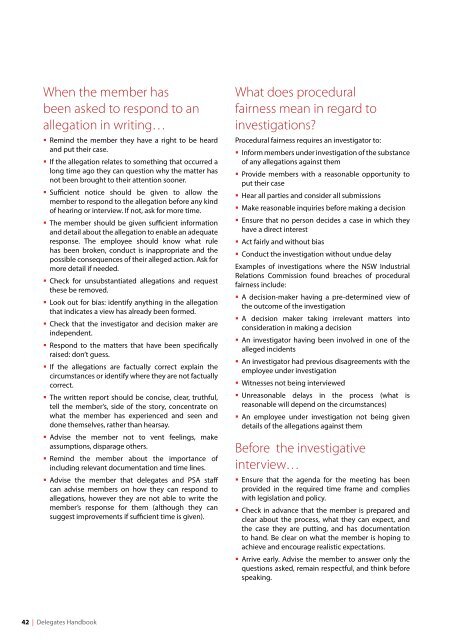Delegates Handbook
delegates_handbook
delegates_handbook
You also want an ePaper? Increase the reach of your titles
YUMPU automatically turns print PDFs into web optimized ePapers that Google loves.
When the member has<br />
been asked to respond to an<br />
allegation in writing…<br />
• Remind the member they have a right to be heard<br />
and put their case.<br />
• If the allegation relates to something that occurred a<br />
long time ago they can question why the matter has<br />
not been brought to their attention sooner.<br />
• Sufficient notice should be given to allow the<br />
member to respond to the allegation before any kind<br />
of hearing or interview. If not, ask for more time.<br />
• The member should be given sufficient information<br />
and detail about the allegation to enable an adequate<br />
response. The employee should know what rule<br />
has been broken, conduct is inappropriate and the<br />
possible consequences of their alleged action. Ask for<br />
more detail if needed.<br />
• Check for unsubstantiated allegations and request<br />
these be removed.<br />
• Look out for bias: identify anything in the allegation<br />
that indicates a view has already been formed.<br />
• Check that the investigator and decision maker are<br />
independent.<br />
• Respond to the matters that have been specifically<br />
raised: don’t guess.<br />
• If the allegations are factually correct explain the<br />
circumstances or identify where they are not factually<br />
correct.<br />
• The written report should be concise, clear, truthful,<br />
tell the member’s, side of the story, concentrate on<br />
what the member has experienced and seen and<br />
done themselves, rather than hearsay.<br />
• Advise the member not to vent feelings, make<br />
assumptions, disparage others.<br />
• Remind the member about the importance of<br />
including relevant documentation and time lines.<br />
• Advise the member that delegates and PSA staff<br />
can advise members on how they can respond to<br />
allegations, however they are not able to write the<br />
member’s response for them (although they can<br />
suggest improvements if sufficient time is given).<br />
What does procedural<br />
fairness mean in regard to<br />
investigations?<br />
Procedural fairness requires an investigator to:<br />
• Inform members under investigation of the substance<br />
of any allegations against them<br />
• Provide members with a reasonable opportunity to<br />
put their case<br />
• Hear all parties and consider all submissions<br />
• Make reasonable inquiries before making a decision<br />
• Ensure that no person decides a case in which they<br />
have a direct interest<br />
• Act fairly and without bias<br />
• Conduct the investigation without undue delay<br />
Examples of investigations where the NSW Industrial<br />
Relations Commission found breaches of procedural<br />
fairness include:<br />
• A decision-maker having a pre-determined view of<br />
the outcome of the investigation<br />
• A decision maker taking irrelevant matters into<br />
consideration in making a decision<br />
• An investigator having been involved in one of the<br />
alleged incidents<br />
• An investigator had previous disagreements with the<br />
employee under investigation<br />
• Witnesses not being interviewed<br />
• Unreasonable delays in the process (what is<br />
reasonable will depend on the circumstances)<br />
• An employee under investigation not being given<br />
details of the allegations against them<br />
Before the investigative<br />
interview…<br />
• Ensure that the agenda for the meeting has been<br />
provided in the required time frame and complies<br />
with legislation and policy.<br />
• Check in advance that the member is prepared and<br />
clear about the process, what they can expect, and<br />
the case they are putting, and has documentation<br />
to hand. Be clear on what the member is hoping to<br />
achieve and encourage realistic expectations.<br />
• Arrive early. Advise the member to answer only the<br />
questions asked, remain respectful, and think before<br />
speaking.<br />
42 | <strong>Delegates</strong> <strong>Handbook</strong>


